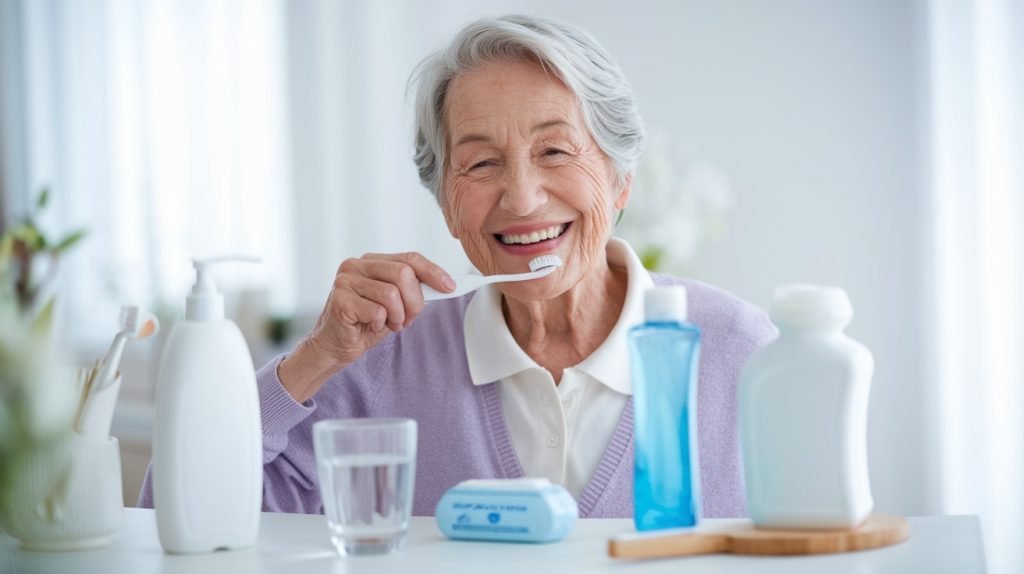Blog
The Best Oral Care Routines for Seniors

As we age, maintaining good oral health becomes even more important. For seniors, oral care plays a vital role in preserving overall health and ensuring comfort. Regular dental hygiene not only helps in preventing tooth decay and gum disease but also contributes to better digestion, speech, and self-esteem. Developing a consistent and effective oral care routine tailored to the needs of older adults is crucial for preserving a healthy smile. Here’s a guide to the best oral care routines for seniors.

1. Brush Twice a Day with Fluoride Toothpaste
The foundation of any good oral care routine is brushing. Seniors should brush their teeth at least twice a day—once in the morning and once before bed. Using fluoride toothpaste helps protect against cavities and tooth decay by strengthening tooth enamel. Be sure to use a soft-bristled toothbrush to avoid damaging sensitive gums. An electric toothbrush can also be a great option for seniors who may have limited dexterity, as it provides more consistent brushing power.
2. Floss Daily to Remove Plaque and Food Particles
Flossing is often overlooked, but it is just as essential as brushing, especially for seniors. Flossing helps remove food particles and plaque from between the teeth and along the gumline, areas that a toothbrush may miss. Seniors should floss at least once a day to prevent gum disease and cavities. For those with arthritis or limited hand mobility, there are floss holders or water flossers available that make flossing easier and more effective.
3. Use Mouthwash for Additional Protection
Mouthwash is an excellent addition to a senior’s oral care routine. It helps kill bacteria, reduce plaque buildup, and freshen breath. Look for an alcohol-free mouthwash, as alcohol can dry out the mouth, which is a common issue for many seniors. A mouthwash with fluoride can also provide added protection against tooth decay and cavities.
4. Stay Hydrated to Prevent Dry Mouth
Dry mouth, also known as xerostomia, is a common problem for seniors, especially those taking medications that can cause reduced saliva production. Saliva is essential for keeping the mouth moist and neutralizing acids that can lead to tooth decay. Seniors should drink plenty of water throughout the day to stay hydrated and stimulate saliva production. Chewing sugar-free gum or sucking on sugar-free lozenges can also help increase saliva flow.
5. Regular Dental Checkups
Even with a consistent oral care routine at home, regular visits to the dentist are essential for seniors. Professional cleanings, checkups, and screenings for oral health conditions can detect problems before they become serious. Seniors should visit the dentist at least once every six months, or as recommended by their dentist, to maintain healthy teeth and gums. Dental professionals can also offer advice on managing oral health challenges that come with age.
6. Maintain a Healthy Diet for Strong Teeth
A balanced diet is crucial for good oral health, especially for seniors. Foods rich in calcium, such as dairy products, leafy greens, and fortified foods, help keep teeth strong and bones healthy. Seniors should also eat plenty of fruits and vegetables, which are not only good for overall health but can help clean teeth naturally. Avoid sugary snacks and beverages, as they contribute to tooth decay and gum disease.
7. Use Denture Care Products If Applicable
For seniors with dentures, proper care is just as important as for natural teeth. Dentures should be cleaned daily with a denture brush and non-abrasive cleaner to remove plaque and food particles. It’s also essential to remove dentures at night to give the gums a break and reduce the risk of infection. Denture adhesives can help provide a secure fit, but it’s important to consult with a dentist for adjustments if dentures no longer fit properly.
8. Consider Dental Products for Sensitive Teeth
As seniors age, their teeth may become more sensitive due to gum recession or enamel wear. If you experience tooth sensitivity, consider using toothpaste specifically designed for sensitive teeth. These products can help reduce discomfort when eating hot, cold, or sweet foods. Speak to your dentist if tooth sensitivity becomes a recurring issue, as it may indicate underlying dental problems.
9. Be Aware of Changes in Oral Health
Seniors should be vigilant about changes in their oral health, as certain conditions become more prevalent with age. Symptoms like bleeding gums, loose teeth, chronic bad breath, or pain in the mouth should be addressed by a dentist immediately. These could be signs of gum disease, oral infections, or other issues that require professional attention.
Conclusion
Maintaining a good oral care routine is essential for seniors, not only to protect their teeth and gums but also to support their overall well-being. By brushing and flossing regularly, staying hydrated, visiting the dentist, and eating a balanced diet, seniors can enjoy a healthy mouth well into their later years. With the right tools and habits, it’s possible to preserve a bright, confident smile throughout life.
